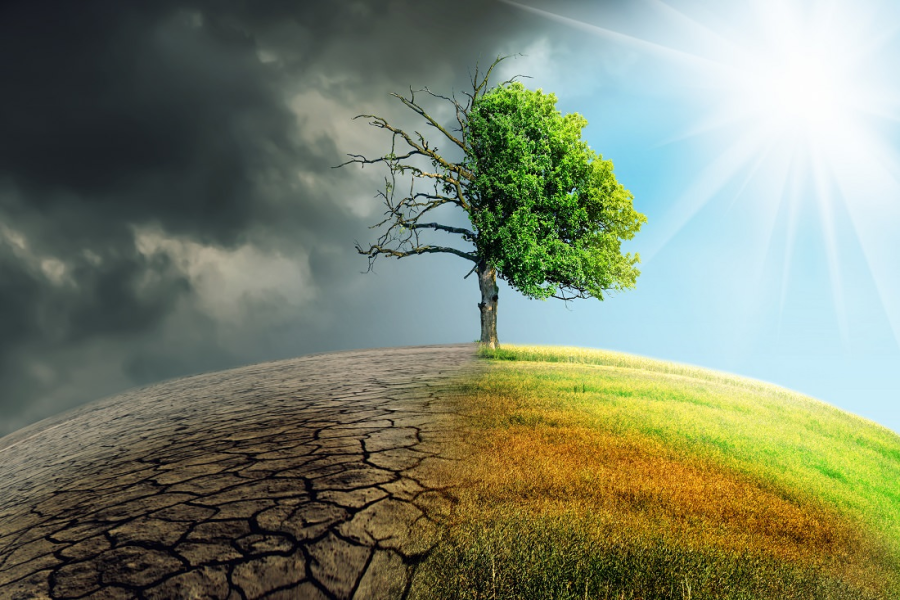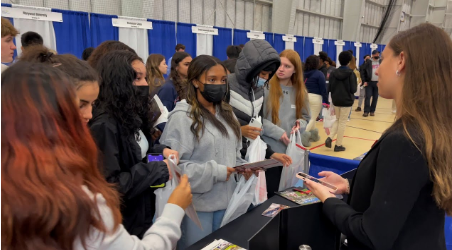Climate Change Needs to Matter
Over the last century, human and natural factors have heavily influenced earth’s climate. According to the Environmental Protection Agency (EPA), “human activities have released large amounts of carbon dioxide and other greenhouse gases into the atmosphere.” Burning fossil fuels, cutting down trees, farming livestock and storing waste in landfills are responsible for the increase in greenhouse gases in the atmosphere. Certain gases in the atmosphere absorb the sun’s energy, preventing the loss of heat to space. This process is necessary to support life. However, human activities are the reason for the recent buildup of greenhouse gases in the atmosphere.
Producing electricity and heat by burning fossil fuels, coal, oil, or gas causes gases such as carbon dioxide and nitrous oxide to fill up in our atmosphere. Adding more carbon dioxide to the atmosphere causes global temperature to rise. According to the EPA, nitrous oxide absorbs radiation and traps heat in the atmosphere. Such activities lead to long term shifts in temperatures and weather.
Long-Term Effects of Climate Change
According to NASA, “The severity of effects caused by climate change will depend on the path of future human activities.” These effects include, wildfires, droughts, extreme rainfall, a decrease in sea ice, and more. Most of these effects are due to greenhouse gases trapping heat in the atmosphere.
How Can We Reduce Greenhouse Gas Emissions?
There are solutions to reduce greenhouse gas emissions. Lowering your heating and air conditioning, switching to LED light bulbs and energy-efficient electrical products, and turning off lights, are all ways to save energy. Cutting your energy consumption lowers carbon dioxide levels. The types of food we consume contribute to global greenhouse gas emissions. We can reduce this by changing the types of food we eat. Eating more plant based foods will help lower emissions and have more impact on the environment. Many vehicles are burning gasoline or diesel. According to the United Nations, walking, riding a bike, and carpooling will reduce greenhouse gas emissions.
Simple Things You Can Do to Help Our Earth.
Follow the three R’s; Reduce, reuse and recycle – help cut down on the amount of waste and conserve energy and landfill space. Use a reusable shopping bag when going grocery shopping. Plastic bags pollute ecosystems and add waste to our landfills. Use eco-friendly cleaning products to reduce water and air pollution. They do not contain damaging chemicals that hurt the environment. Use less water. Conserving water saves energy, saves money on your power bills and keeps wetland habitats filled for animals and fish.
Make your voice heard.
Do your research on climate change to understand the changes that are happening in our world. Join any local social movement, campaign or projects that focuses on environmental issues. No matter where you live, climate change affects all of us. Play an active role through activism and protest. Talk about climate change. Activists today like Greta Thunberg, started out with holding a sign and now she has inspired people to organize their own protests. Communication is one of the most important factors during this time.
If we start working now, we can slow down climate change. It is important to understand and do something about it before its too late. If we don’t act now we could face long-term affects. “It’s now or never, if we want to limit global warming to 1.5°C (2.7°F); without immediate and deep emissions reductions across all sectors, it will be impossible,” said Jim Skea, Co-Chair of IPCC Working Group III. If our earth continues like this, these long term effects would become more extreme.
Citations:
“Generating Power | United Nations.” Climate Action, https://www.un.org/en/climatechange/climate-solutions/cities-pollution.
EPA, Environmental Protection Agency, https://www.epa.gov/climatechange-science/causes-climate-change.
EPA, Environmental Protection Agency, https://www.epa.gov/smm/resources-waste-and-climate-change.
Palutikof, Jean, et al. “Diet, Climate Change and Health: News.” Wellcome, 7 June 2022, https://wellcome.org/news/changing-your-diet-can-help-fight-climate-crisis.
Igini, Martina. “The Truth about Online Shopping and Its Environmental Impact.” Earth.Org, 20 Dec. 2021, https://earth.org/online-shopping-and-its-environmental-impact/#:~:text=Products’%20packaging%20contributes%20in%20large,forest%20conservation%20group%20Canopy%20found.
“Welcome to the United Nations.” Start with These Ten Actions!, https://www.un.org/en/actnow/ten-actions.
“9 Things You Can Do about Climate Change.” Imperial College London, https://www.imperial.ac.uk/stories/climate-action/.
Huzar, Timothy. “Climate Change and Diet: Why Making Smaller Changes May Be Better.” Medical News Today, MediLexicon International, 2022, https://www.medicalnewstoday.com/articles/climate-change-substituting-food-items-rather-than-whole-diets-can-still-make-a-big-difference#Food-and-global-heating.
“Overview of Greenhouse Gases.” EPA, Environmental Protection Agency, 16 May 2022, https://www.epa.gov/ghgemissions/overview-greenhouse-gases.
“Basics of Climate Change.” EPA, Environmental Protection Agency, 19 Aug. 2022, https://www.epa.gov/climatechange-science/basics-climate-change.






